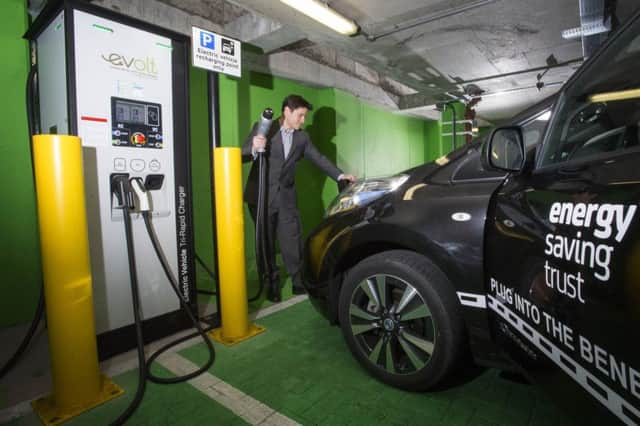Electric cars to reach most isolated parts of Scotland


The geography of the Highlands may not lend itself as a prime location for electric vehicles (EV) – but a surge in demand has seen massive investment in the setting up of additional charging points across isolated parts of the region.
Experts said long distances in the Highlands have traditionally led to “range anxiety” among some potential users.
Advertisement
Hide AdAdvertisement
Hide AdBut with the number of owners of EV’s in Scotland now topping the thousands, and increased interest in the most northern parts of the country, it is hoped a£900,000 investment will give drivers in the Highlands more confidence.
Government agency Transport Scotland has a strategy, supported by Switched on Scotland, to provide facilities at 35 mile intervals – but the logistics in the Highlands make that a difficult target.
However, a spokesman said: “Transport Scotland is working to increase the connectivity and resilience of the ChargePlace network, and as a result they are investing over £900,000 through Highland Council to ensure the key transport corridors through the area are available for use by EV drivers.
“Our support is enabling the Highland Council to install 20 rapid chargers, eight of which have already been commissioned – Inverness, Helmsdale, Portree, Grantown on Spey and Tain – with a further six due to be commissioned by the end of this week.
“The remainder are expected to be commissioned in the coming months.”
He added: “We anticipate that the installation of the rapid chargers will provide greater flexibility for both fleet and private vehicles in the area.”
The last three years have seen a remarkable surge in demand for electric vehicles in the UK – new registrations of plug-in cars increased from 3,500 in 2013 to more than 45,000 by the end of September this year.
Martin Sherring, of Transition Black Isle, said: “Long distances in the Highlands mean that ‘range anxiety’ is a serious barrier to electric vehicle use.
Advertisement
Hide AdAdvertisement
Hide Ad“We hope this project will reduce the barrier by enabling electric vehicle owners to recharge at their destination, ready for the trip home.
“And we aim to tick some other important boxes too, ensuring the electricity used is from renewable sources, re-using batteries which would otherwise become a waste disposal problem, and generating income for local communities.”
Louise Smith, director of Thurso consultancy Caithness Renewables, was seeking the views of Caithness and Sutherland transport users about the current use of electric vehicles and potential future developments.
She said: “The opinions of Caithness and Sutherland residents will fundamentally shape the direction of this project, and we are looking forward to an interesting consultation period.”
Caithness Rural Transport co-ordinator Coreen Campbell, said: “You may currently own an electric car, so we want to develop the project around where you live and work, what trips you currently use the car for and what potential trips you could make if rapid chargers were available.”
She added: “The detail behind this is a series of survey questions including which Highland locations you think might be useful for rapid charging stations. We also want to hear from any organisations - businesses, the public sector or community groups - that would be willing to host a charging point. You should ideally be located near the main road network and have an area where vehicles can pull in and park.”
Felix Wight, head of development at Community Energy Scotland explained: “Combining renewable energy with electric vehicles could be a double win for Highland communities, by allowing new energy generation projects to connect to areas of the grid that have limited capacity, and providing a source of sustainable electric fuel from local resources.”
Electric vehicle owners currently pay no road tax and are cheaper to run at 2p to 3p a mile to power an electric car compared to 16p a mile for the average fossil-fuelled family car. Scottish households that buy an electric vehicle have the added bonus of a 100 percent grant for a home charging point.
Monthly figures published by the Society of Motor Manufacturers and Traders (SMMT) show that electric car sales in the UK have risen dramatically during the past 12 months.